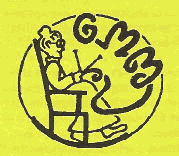.Grandma's Magical Math
"An easy way to learn math facts!"
The Psychology of Grandma

"Math is fun when you know the answers."
Nothing has the power to destroy a child's self-confidence and love of learning like arithmetic. It demands a steady stream of answers that are either right or they are wrong. You either know it or you don't. Failure is a constant worry for some children. Guessing causes many mistakes and much frustration. Strategies to figure out the answers drain away the joy because they require so much hard work.
Grandma's Magical Math helps students develop healthy attitudes
about math, about themselves and other people.
-
Children are shown how to do arithmetic problems correctly. Then they are given the opportunity to practice getting the right answers. They practice success.
-
Students "play with" the coat hanger and clothespins abacus and see for themselves that the addend partners in the pictures are correct. They practice understanding.
-
In a relaxed kindergarten or first grade setting, using "Beat the Clock" workbook pages, students are taught how to do "timed" practice papers just for fun. The teacher pretends to time them, adjusting the "timing" to the speed of the class. This helps students improve their speed gradually. The children practice doing math quickly. They practice taking timed tests calmly.
-
The whole class moves together through Grandma's Magical Math. If at all possible, they stay on one picture until everyone has "got it". They practice unity - being part of the group progressing together as a team.
-
Games are cooperative. Winning is purely by chance. Competition defeats learning for some students, who simply give up because they can never win. But cooperation always encourages learning. Features to eliminate friction between students are woven into the games. They practice working together peacefully.
-
Students take turns holding the pointer, and point to the numbers on the posters as the class sings. In preparation to present "Show and Tell" pages at home, students practice as partners, quietly singing the songs and pointing with fingers to the pictures in the workbook. They practice successfully performing for others.
-
Parents and other care givers are included in the lessons with take home pages. Students practice communicating new ideas to the most important people in their lives.
-
There is ample opportunity, both at home and at school, for each student to receive the praise he or she has earned for a job well done. This builds confidence in his or her ability to learn and a desire to learn more.
Stages of Learning
-
Students look at the pictures to find the answers.
-
Students look at pictures only when not completely sure of the answers.
-
Students no longer look at the pictures, but think of them as needed.
-
Students remember the numbers without even thinking of the pictures.
This takes practice. Use of the workbooks is essential to arrive at Stage 4, where memorization is permanent.

Grandma's Magical Math
www.GrandmasMath.com
Copyright 2016 by Grandma's Magical Math Inc.